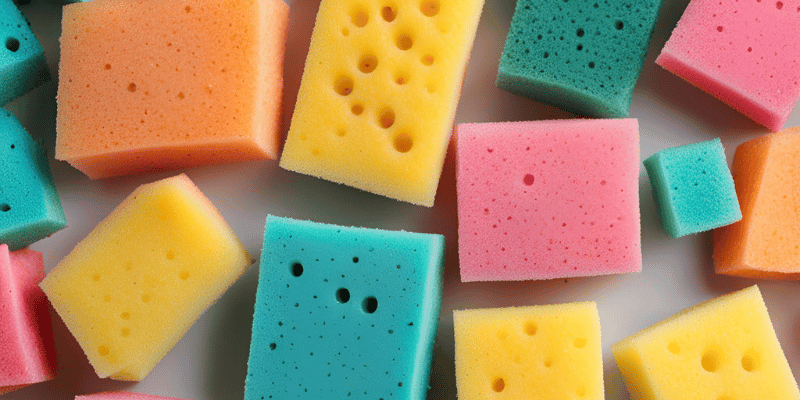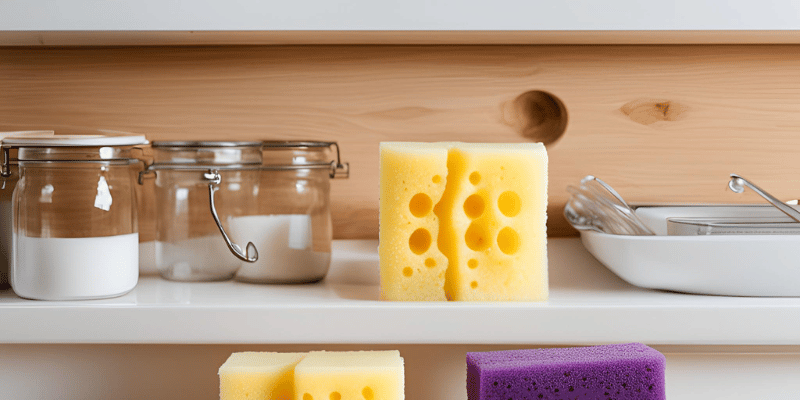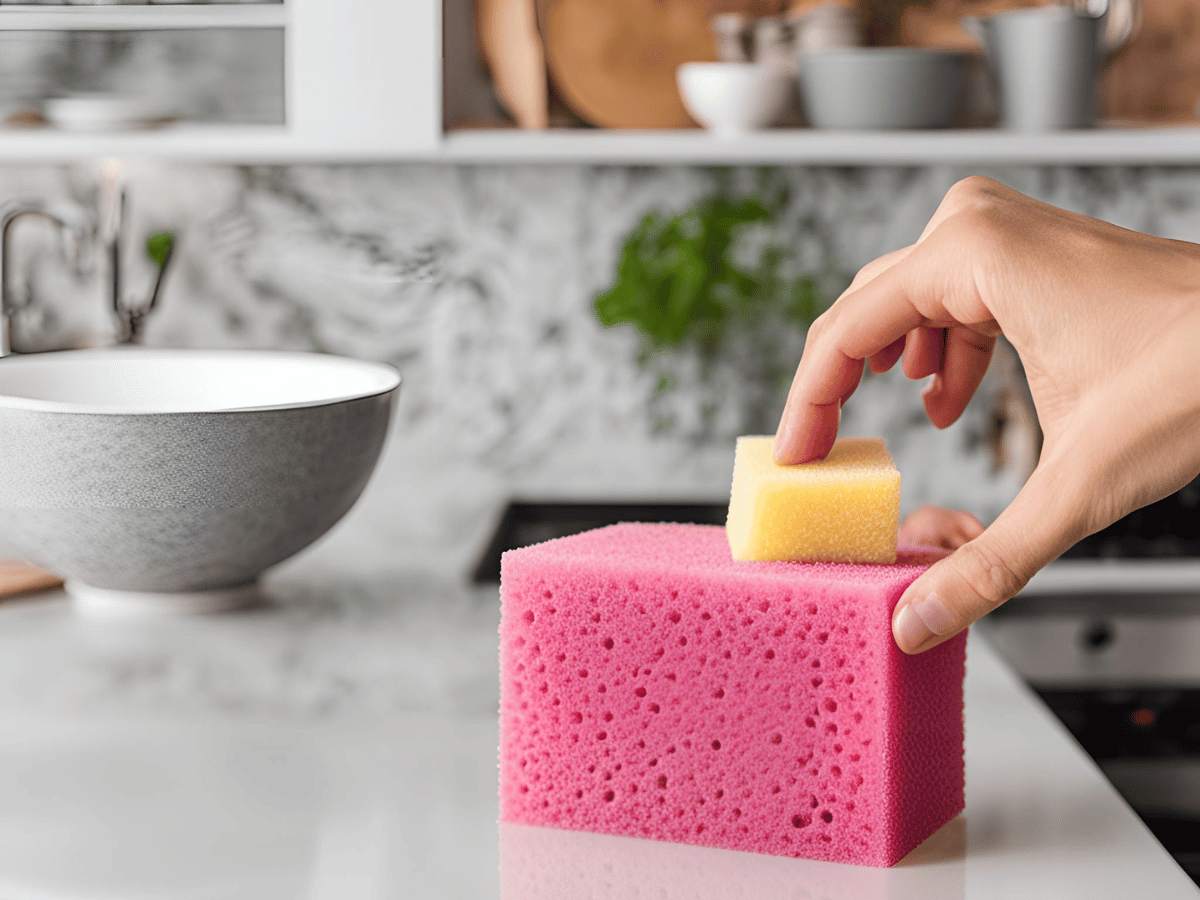Ever wondered why your kitchen sponge can smell so bad? It’s not just the smell that’s the problem. It can also mean there are harmful bacteria and mold around. Learning how to keep your kitchen sponges fresh is key to a clean kitchen. We’ll share 5 easy tips to keep your sponges smelling good and prevent bad odors at home.
Key Takeaways
- Understanding the causes of sponge odor is crucial to prevention.
- Daily rinsing and proper drying play a significant role in keeping sponges fresh.
- Natural cleaning methods, such as using vinegar and baking soda, are effective and eco-friendly.
- Regularly replacing sponges is important for hygiene and odor control.
- Using advanced cleaning techniques can enhance sponge sanitation.
Understanding the Cause of Kitchen Sponge Odor

Kitchen sponge odor comes from two main sources: bacteria and mold growth, and food and oil buildup. Knowing these causes is key to removing kitchen sponge odor and keeping sponges fresh.
Growth of Bacteria and Mold
The warm, damp environment of kitchen sponges is perfect for bacteria and mold. These tiny organisms love the moisture and leftover food, causing bad smells. To stop this, it’s important to keep your sponge dry.
Food Particles and Oil Residue
Food bits and oil stick to sponges after washing greasy dishes. These leftovers break down and smell bad. Cleaning your sponge often helps get rid of these smells and keeps it fresh.
How to Keep Kitchen Sponges from Smelling
To keep kitchen sponges from smelling bad, you need to maintain them well and choose the right materials. Simple habits can make your sponges last longer and keep them fresh for cleaning. Here are some key tips.
Daily Rinsing and Proper Drying Techniques
Rinse your sponge well after each use to stop it from smelling. It’s important to remove food bits and soap that can attract bacteria. Then, squeeze out the sponge and let it dry in a place with good air flow.
This helps stop bad smells from coming from your sponge. You can put your sponge on a drying rack or hang it to help it dry faster. This method is great for keeping your kitchen smelling fresh.
Choosing the Right Sponge Material
Choosing sponges made from materials that fight bacteria is also a good idea. These sponges are less likely to smell bad. Going for eco-friendly options is good for the planet and helps keep your kitchen clean.
Using these sponges is a smart way to avoid bad smells in your kitchen. It makes cleaning easier and keeps your kitchen smelling nice.
Natural Cleaning Methods for Your Sponges
Natural cleaning methods are a simple and effective way to keep kitchen sponges clean. They help get rid of bad smells and support eco-friendly care. We’ll look at two great ingredients: vinegar and baking soda. These are perfect for keeping your sponges fresh.
Using Vinegar as an Eco-Friendly Disinfectant
Vinegar is a budget-friendly, eco-friendly choice for cleaning sponges. Soak your sponge in full-strength vinegar for about five minutes. This kills bacteria and keeps your sponge clean. After soaking, just rinse it to make it fresh and odor-free.
Employing Baking Soda for Odor Neutralization
Baking soda is great at getting rid of bad smells. Mix it with a bit of water to make a paste. Apply this paste to your sponge and let it sit for a few minutes before rinsing. Using baking soda often keeps your sponges smelling fresh and supports good hygiene.
The Benefits of Regular Sponge Replacement
Keeping your kitchen clean means paying attention to the tools you use daily. The kitchen sponge is key, but it can gather bacteria and smells. Knowing when to replace it can make your kitchen cleaner and healthier. Let’s look at the best ways to replace sponges and eco-friendly choices.
When to Replace Your Kitchen Sponge
It’s smart to replace your kitchen sponge every few weeks. If it looks old, has stains, or smells bad, it’s time for a new one. Checking your sponge often keeps it clean and ready for cleaning. Changing it often boosts hygiene and makes your kitchen smell nice.
Choosing Eco-Friendly Sponge Options
Switching to eco-friendly sponges helps your dishes and the planet. Choose ones made from natural stuff like cellulose or loofah. They break down easily. Some sponges also stop bacteria from growing, adding more cleanliness. Going for these options cuts down on plastic waste and keeps your kitchen welcoming.
Advanced Techniques for Sponge Disinfection

Keeping kitchen sponges clean is key to a healthy cooking area. Two top methods help remove bacteria: the microwave and dishwasher cleaning. These methods kill germs and make cleaning easy.
Microwave Method for Quick Disinfection
The microwave is a quick way to clean sponges. Make sure your sponge is damp before starting; a dry sponge can catch fire. Put the wet sponge in the microwave and heat it on high for one minute. This kills a lot of bacteria fast, keeping your kitchen clean.
Dishwasher Cleaning for Maximum Efficiency
Using the dishwasher is another great way to clean sponges. Just put your sponges in the dishwasher during the heat-dry cycle. The high heat kills tough bacteria and gets rid of bad smells. Doing this often makes your sponges last longer and keeps them fresh.
| Method | Time Required | Effectiveness |
|---|---|---|
| Microwave Method | 1 minute | High |
| Dishwasher Cleaning | Cycle time varies (approx. 1-2 hours) | Very High |
Tips to Prevent Foul Smell in Kitchen Sponge
Proactive steps can greatly help stop sponge odor in the kitchen. Keeping sponges in the right place and keeping your kitchen clean are key. This ensures your kitchen tools stay fresh and free from bad smells.
Proper Storage Solutions
Effective storage is key to avoiding odors. Here are some important tips:
- Store sponges in a well-ventilated area.
- Avoid placing them in damp locations, like sinks or wet countertops.
- Consider using a sponge holder that allows airflow.
- Keep sponges away from food particles and cleaning agents.
Maintaining a Clean Kitchen Environment
Keeping your kitchen clean helps reduce the chance of odors in sponges. Here’s what to do:
- Regularly wipe down surfaces to remove food residue.
- Clean spills immediately to prevent attracting bacteria.
- Empty and clean the sink daily to eliminate stagnant water.
- Conduct a weekly deep clean focusing on sponge usage areas.
| Storage Method | Benefits |
|---|---|
| Ventilated holder | Promotes airflow, reducing moisture retention |
| Avoiding damp areas | Prevents sponge saturation and bacterial growth |
| Frequent kitchen cleaning | Maintains hygiene, preventing odors in both sponges and surfaces |
Using these strategies will help prevent sponge odor in the kitchen. It will also make your kitchen a cleaner place.
Conclusion
Keeping kitchen sponges fresh and odor-free is key to a clean and pleasant kitchen. Knowing why sponges smell can help you keep them clean. By rinsing, replacing old sponges, and using natural cleaners like vinegar and baking soda, you can improve how you care for your sponges.
This guide shows that small changes can make a big difference. Using the right storage and keeping your kitchen clean helps your sponges stay fresh. These simple steps lead to healthier and more enjoyable cooking.
Using these methods makes your kitchen fresher and supports eco-friendly living. Start on the path to keeping your kitchen sponges clean for a greener home.
FAQ
How can I prevent sponge odor in my kitchen?
To prevent sponge odor, rinse your sponge well after each use. Make sure it dries completely. Also, keep it in a place with good airflow. Using sponges with antimicrobial properties can also help reduce bacteria.
What are the best ways to stop sponge smell?
Stop sponge smell by rinsing your sponge daily. Clean it with natural items like vinegar and baking soda. And, change your sponge every few weeks or if it smells bad.
How can I keep my kitchen sponges fresh?
To keep sponges fresh, rinse them after each use and let them dry fully. Use eco-friendly cleaners. And, change them often to stop bacteria from building up.
What natural cleaning methods can I use for my sponges?
For natural cleaning, soak sponges in vinegar to kill bacteria. Or, use a baking soda paste to get rid of odors. Both are good for the planet and work well.
When should I replace my kitchen sponge?
Replace your kitchen sponge every few weeks or if it looks worn or smells bad after cleaning.
Can I use a microwave to disinfect my sponge?
Yes, microwave your damp sponge for one minute to kill bacteria. Just make sure it’s wet to avoid any fire risks.
What storage solutions can help prevent foul smell in kitchen sponges?
Keep sponges in a well-ventilated spot, not in damp places. And, don’t leave them on the sink to stop moisture and bad smells.
How can I maintain a clean kitchen environment to help with sponge odor?
To keep your kitchen clean, clean surfaces often, remove food quickly, and keep sponges dry. This stops odors from forming in your sponges and kitchen.
Source Links
- Ask Me Anything: Smelly Sponges, Wood Cleaners, Kids’ Savings Accounts – https://www.everydaycheapskate.com/smelly-sponges-wood-cleaners-kids-saving-accounts-more/
- How to Keep Kitchen Scrubber from Smelling with SuperBee – https://superbee.me/how-to-keep-kitchen-scrubber-from-smelling/
- If You’re Not Cleaning Kitchen Sponges, You Really Need to Start – https://www.bhg.com/homekeeping/house-cleaning/tips/how-to-clean-a-kitchen-sponge/
